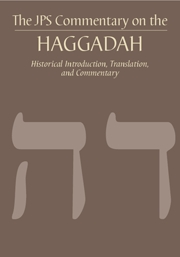 To all of you, my friends who read this blog:
To all of you, my friends who read this blog:May this zman cherutenu (time of our freedom) be a time when you personally experience God's deliverance of his people--suddenly, and in big ways.
Chag sameach...gut Pesach...happy Passover.
~Yahnatan
 I was struck by this comment from the JPS Commentary on the Haggadah:
I was struck by this comment from the JPS Commentary on the Haggadah:What is presumably the major event of the evening--the meal--is unaccompanied, at least in this stage of history, by any texts. This is most remarkable when we realize that the paschal lamb was brought in whole. Bringing a whole animal before the participants must have been a dramatic event.I had never thought about this before. Curious, I googled "roasted lamb" and found an image that conveys some of the "drama" R. Tabory mentions. (Warning: not for the faint of heart!)
 March is flying by! Passover is only one week away, and we're ready to do some serious chametz removal.
March is flying by! Passover is only one week away, and we're ready to do some serious chametz removal. Here's me with Netzer Chosid, a longtime friend. N''C's posts are few and far between, but they're real gems. Hopefully he'll find ways to continue sharing his insights.
Here's me with Netzer Chosid, a longtime friend. N''C's posts are few and far between, but they're real gems. Hopefully he'll find ways to continue sharing his insights. And here's me with Rabbi Russ Resnick, who was one of the speakers for the conference. His talk, called "Walk the Talk," used Isaiah 52:7 as a starting point to talk about what it means to proclaim the gospel with our lives as well as our words.
And here's me with Rabbi Russ Resnick, who was one of the speakers for the conference. His talk, called "Walk the Talk," used Isaiah 52:7 as a starting point to talk about what it means to proclaim the gospel with our lives as well as our words. I've used CustomInk twice now to make t-shirts, and they are one of my favorite companies. Their website is so easy to use: I would start messing around with an idea, and before I knew it, I'd be ready to order a t-shirt. And their customer service is top notch too.
I've used CustomInk twice now to make t-shirts, and they are one of my favorite companies. Their website is so easy to use: I would start messing around with an idea, and before I knew it, I'd be ready to order a t-shirt. And their customer service is top notch too. Do you or your friends have nut allergies? Consider trying a nut-free charoset recipe this Pesach.
Do you or your friends have nut allergies? Consider trying a nut-free charoset recipe this Pesach. Over at the Jesus Creed blog, Scot McKnight challenges the idea that the Bible teaches charity should be left up to individuals, and that the government shouldn't have anything to do with it.
Over at the Jesus Creed blog, Scot McKnight challenges the idea that the Bible teaches charity should be left up to individuals, and that the government shouldn't have anything to do with it.That Jesus didn't speak about electing a government is beside the point; he didn't have that option. He did live in a world governed by a Torah that let the government have laws that mandated care for the poor. He lived in a world that didn't just leave it up to individuals. Sure, there was lots of private charity. That too, on top of laws.
 J-BOM (the Jewish Book of the Month club) officially starts today. (In case you don't know what I'm talking about, click here.)
J-BOM (the Jewish Book of the Month club) officially starts today. (In case you don't know what I'm talking about, click here.)[The] proclivity for contemporizing the haggadah can be traced back to the haggadah text itself. In one of its most famous passages, it instructs its reader, the participant in the seder, "to see him or herself as though they had gone out of Egypt." Historically, Jews have fulfilled this instruction in different ways, sometimes even acting out the Exodus by marching around the seder table! Since the early Middle Ages, however, probably the most typical way Jews have made the haggadah speak to their contemporary concerns and needs has been through the act of composing commentaries on it and then drawing on their elaborations and interpretations at the seder. These commentaries have been of every conceivable type--midrashic, legalistic, homiletical, ethical, philosophical, and mystical. And each has added a different and additional layer of meaning to the ritual.I'd like to suggest that we take Stern's observation as an exhortation: that as we read the haggadah through this commentary, we also engage in creating our own commentaries on the haggadah, commentaries which reflect our own particular story, giftings, and passions.
 Have you ever wrestled over the question of whether Messianic Jews should keep Torah or not?
Have you ever wrestled over the question of whether Messianic Jews should keep Torah or not?